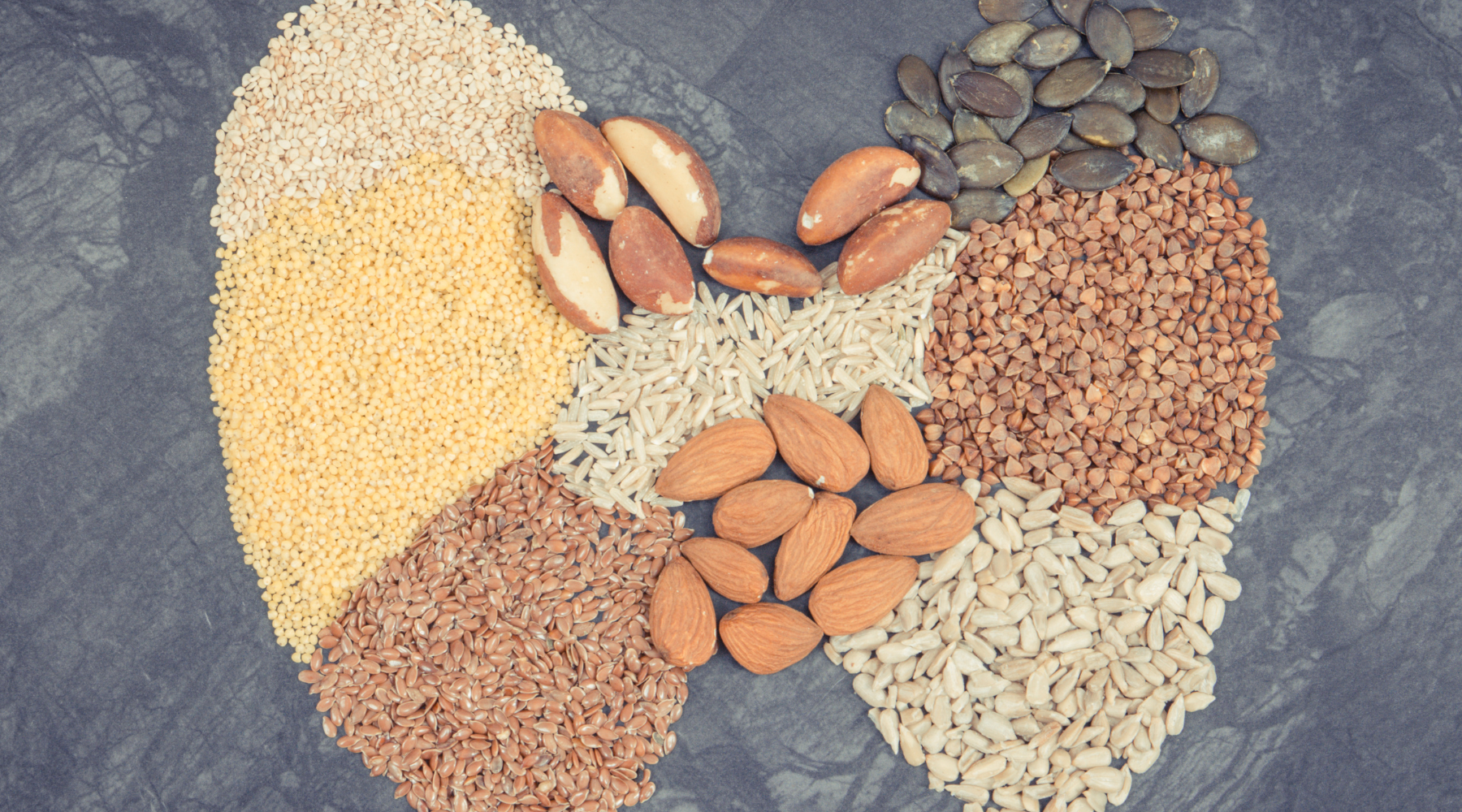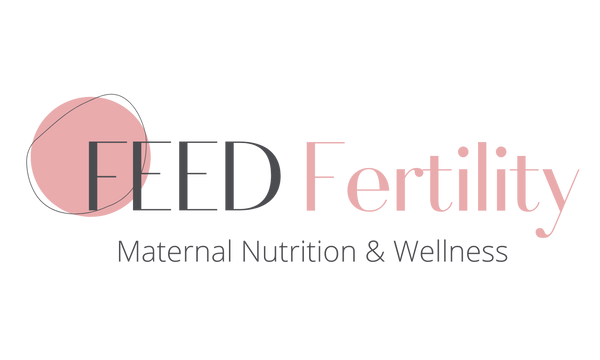
Thyroid Health: A Guide for Trying To Conceive
Are you trying to conceive and wondering if your thyroid health might be playing a role? The thyroid gland, a small butterfly-shaped organ located in your neck, plays a vital role in regulating metabolism, energy levels, and overall health. It also exerts a significant influence on your reproductive system, impacting ovulation, menstrual regularity, and even pregnancy outcomes.
This comprehensive guide explores the crucial connection between thyroid function, fertility, and the power of a nourishing diet. We'll delve into the science behind how thyroid hormones influence fertility, explore key nutrients that support optimal thyroid function, and provide practical dietary and lifestyle tips to optimize your health for a successful journey towards conception.
The Thyroid and Its Role in Fertility
The thyroid gland produces hormones, primarily thyroxine (T4) and triiodothyronine (T3), that regulate various bodily functions. These hormones influence:
- Basal metabolic rate (BMR): The rate at which your body burns calories for energy.
- Cell growth and repair: Essential for healthy development of eggs and sperm.
- Mood and energy levels: Can impact overall well-being and stress management.
- Ovulation and menstrual cycle regulation: Thyroid hormones play a critical role in these processes.
Balanced thyroid function is essential for optimal fertility. When the thyroid is underactive or overactive, it can disrupt ovulation, menstrual regularity, and even increase the risk of miscarriage. Hypothyroidism (underactive thyroid) occurs when the thyroid gland doesn't produce enough thyroid hormones. Symptoms can include fatigue, weight gain, irregular periods, and difficulty getting pregnant. Hyperthyroidism (overactive thyroid) develops when the thyroid produces too much thyroid hormone. Symptoms may include weight loss, anxiety, irregular heartbeats, and difficulty maintaining a pregnancy. It's important to note that these are just general symptoms, and a proper diagnosis from a healthcare professional is crucial.

Thyroid Function Tests
Before we delve into the specifics of dietary support for thyroid health and fertility, understanding thyroid function tests is crucial. These tests help healthcare professionals assess your thyroid function and identify potential issues. Thyroid function testing is often recommended for women trying to conceive or experiencing fertility challenges. Early detection and management of thyroid disorders can significantly improve fertility outcomes. Several tests are used to evaluate thyroid function. The most common ones include:
- Thyroid-stimulating hormone (TSH): This is the primary test used to assess thyroid function. TSH is produced by the pituitary gland and stimulates the thyroid gland to produce T4 hormone.
- Free T4: Measures the amount of circulating T4 hormone available to cells.
- Free T3: Measures the active form of thyroid hormone.
- T3 uptake test: An indirect assessment of thyroid hormone binding to proteins in the bloodstream.
- Thyroid antibody tests: These tests help identify autoimmune thyroid diseases like Hashimoto's thyroiditis, a common cause of hypothyroidism.
A qualified healthcare professional will interpret your test results based on established reference ranges. Generally, a TSH level between 0.4 mIU/L and 4.5 mIU/L is considered normal. However, for optimal fertility, some healthcare providers recommend a TSH level closer to 2.5 mIU/L. However, optimal ranges may vary depending on individual factors and specific circumstances. Always discuss your test results with your healthcare provider to understand their implications for your fertility journey.
Key Nutrients for Thyroid Health
Nourishing your body with the right nutrients is essential for optimal thyroid function and fertility. Here, we'll explore some key dietary players that can support a healthy thyroid and promote a successful journey towards conception:
1. Iodine
Function: Plays a critical role in the production of thyroid hormones T4 and T3.
Dietary Sources: Iodized salt, seaweed, cod, shrimp, dairy products.
Considerations: Iodine deficiency can contribute to hypothyroidism and fertility issues. However, excessive iodine intake can also be detrimental. Consult your healthcare provider to determine the appropriate iodine intake for you.
2. Selenium
Function: Essential for converting T4 into the active T3 hormone.
Dietary Sources: Brazil nuts, seafood (tuna, sardines), organ meats (liver, kidney).
Considerations: Selenium deficiency can impair thyroid function. However, high doses can be toxic. Consult a healthcare professional for guidance on safe selenium intake.
3. Zinc:
Function: Supports healthy thyroid function and hormone balance.
Dietary Sources: Oysters, red meat, pumpkin seeds, lentils.
Considerations: Zinc deficiency can contribute to thyroid dysfunction. Consult a healthcare professional if you suspect a deficiency.
Summary of Key Nutrients & Food Sources:
| Nutrient: | Function: | Food Sources: |
| Iodine | Thyroid hormone production | Iodized salt, seaweed, seafood |
| Selenium | Conversion of T4 to T3 | Brazil nuts, seafood, organ meats |
| Zinc | Supports thyroid function & hormone balance | Oysters, red meat, pumpkin seeds |
| . |
Additional Nutrients to Consider
While the nutrients mentioned above play a central role, a balanced diet rich in a variety of vitamins and minerals is crucial for overall health and thyroid function. Here are a few honourable mentions:
Vitamin D: Emerging research suggests a potential link between vitamin D levels and thyroid function. Consider including dietary sources like fatty fish, eggs, and mushrooms, or consider supplementation.
Iron: Iron deficiency can be common, especially among women. Adequate iron stores are crucial for overall health and may indirectly impact thyroid function.
B Vitamins: The B vitamin family plays a role in various bodily functions, including hormone metabolism. Include whole grains, legumes, and leafy greens in your diet for a good source of B vitamins.
Remember, a balanced diet is key! Aim to include a variety of colorful fruits and vegetables, whole grains, lean protein sources, and healthy fats in your meals. This will provide your body with the essential nutrients it needs to support optimal thyroid function and fertility.

Dietary Considerations for Thyroid Health
While incorporating the key nutrients discussed earlier is essential, there are also some dietary factors to consider for optimal thyroid health and fertility:
1. Goitrogens
Goitrogens are naturally occurring substances in certain foods that can interfere with thyroid hormone production. Goitrogenic foods include soy products (tofu, tempeh), cruciferous vegetables (cauliflower, broccoli, Brussels sprouts). The good news is that proper food preparation can minimize any potential effects. Cooking cruciferous vegetables can further reduce their goitrogenic effect. If you have a diagnosed thyroid condition, consult your healthcare professional regarding appropriate intake of goitrogenic foods.
2. Gluten Sensitivity
Gluten sensitivity, or celiac disease, is an autoimmune disorder triggered by gluten, a protein found in wheat, barley, and rye. While not directly related to thyroid function, some research suggests a potential link between gluten sensitivity and autoimmune thyroid diseases like Hashimoto's thyroiditis. If you suspect gluten sensitivity, discuss it with your doctor and consider getting tested.
3. Other Food Sensitivities
Hidden food sensitivities, although less common than gluten sensitivity, can sometimes contribute to gut health issues that might indirectly affect thyroid function. Symptoms of food sensitivities can be varied and non-specific. If you suspect you might have food sensitivities, consider working with a registered dietitian to identify potential triggers through an elimination diet. Remember, self-diagnosis and restrictive elimination diets without proper guidance can be counterproductive.
4. Blood Sugar Balance
Maintaining stable blood sugar levels is crucial for overall health and may indirectly impact thyroid function. Blood sugar spikes and crashes can stress the body and potentially disrupt thyroid hormone regulation. It’s important to focus on a balanced diet that includes complex carbohydrates, lean protein sources, and healthy fats. This helps regulate blood sugar and promotes sustained energy levels.
5. Hydration
Adequate water intake is essential for various bodily functions, including the proper functioning of the thyroid gland. Aim to drink plenty of water throughout the day to stay hydrated and support overall health.
By being mindful of these dietary considerations and incorporating the key nutrients discussed previously, you can create a foundation for a healthy diet that supports optimal thyroid function and fertility.

Lifestyle For Thyroid Health
While diet plays a crucial role in optimizing thyroid function for fertility, lifesyle factors such as stress, sleep and physical environment also play a pivitol role. That's why a holistic approach encompassing healthy lifestyle practices is essential. The three biggest lifestyle factors include...
1. Stress Management:
Chronic stress can negatively impact your overall health, including thyroid function. When stressed, your body releases cortisol, a hormone that can interfere with thyroid hormone production. Here's how stress messes with your thyroid:
- Slows down hormone production: Cortisol, the stress hormone, can suppress the production of T3 and T4, the hormones your thyroid makes to regulate your metabolism.
- Blocks T4 conversion: Even if your thyroid is producing T4 (the inactive form), stress can prevent it from converting to the active form (T3) your body needs.
- Increases inflammation: Chronic stress can trigger inflammation, which can further disrupt thyroid function and worsen symptoms.
Incorporating effective stress-reduction techniques into your daily routine such as yoga, meditation, and time in nature can help support thyroid function and improve fertility outcomes. To learn more about how sleep affects fertility, and tips on how to manage your stress, visit our article 5 Lifestyle Changes for Female Fertility.
2. Sleep Hygiene
Quality sleep is vital for overall health and hormone regulation, including thyroid function. Here's how sleep impacts your thyroid:
- Regulates hormone production: During sleep, your body releases TSH, the hormone that tells your thyroid to produce T3 and T4. Without enough sleep, this cycle gets disrupted.
- Boosts conversion: Sleep also helps convert T4 (inactive) to T3 (active), which your body needs for energy and metabolism.
- Supports overall health: Poor sleep can contribute to stress and inflammation, both of which can worsen thyroid function.
Aim for 7-8 hours of restful sleep each night. For a comprehensive guide on how to establishing good sleep hygiene and improve the quality and quantitiy of your sleep, read our article: Secrets to A Blissful Sleep.
3. Reducing Environmental Toxins:
Certain environmental toxins can disrupt thyroid function. These are called thyroid disrupting chemicals (TDCs), a subfamily of endocrine disruptors which interfere with thyroid function indirectly by affecting the hypothalamo-pitutary-thyroid axis, or directly by binding to thyroid hormone receptors. While complete avoidance might not be possible, here are some ways to minimize your exposure, like reducing plastic use, and choosing clean, eco-friendly cleaning products. For a detailed guide on how to avoid these harmful compounds, visit: Endocrine Disruptors, The Hidden Threat To Your Fertility.
Throughout this guide, we've explored the vital connection between thyroid health, nutrition, and fertility. We've discussed the role of thyroid hormones in regulating ovulation, menstrual regularity, and pregnancy outcomes. We've also highlighted key nutrients that support optimal thyroid function, explored dietary considerations, and emphasized the importance of healthy lifestyle practices.
By incorporating the knowledge and strategies presented in this guide, you can take an active role in optimizing your thyroid health through dietary choices and lifestyle modifications. Remember, a balanced and nourishing diet rich in essential nutrients, combined with stress-reduction techniques, quality sleep, and regular exercise, can create a foundation for optimal health, potentially improving your chances of a successful conception and a healthy pregnancy.
Disclaimer: The information presented in this blog post is for educational purposes only and should not be construed as medical advice. Always consult with a qualified healthcare professional before making any changes to your diet, lifestyle, or treatment plan.
Sources:
- American Thyroid Association. (n.d.). Goitrogens. https://www.thyroid.org/
- American Thyroid Association. (n.d.). Thyroid Testing. https://www.thyroid.org/
- National Institutes of Health. (n.d.). Iodine. https://ods.od.nih.gov/factsheets/Iodine-HealthProfessional/
- Environmental Working Group. (n.d.). Thyroid Disrupting Chemicals. https://www.ewg.org/research/thyroid-threat
- Gartner, L. M., & Martyn, C. N. (2008). Potential mechanisms of dietary goitrogen action in the development of iodine deficiency. Endocrine Reviews, 29(6), 883-910. https://pubmed.ncbi.nlm.nih.gov/8675242/
- Gleicher, N., Barnhart, K. T., & Paulozzi, L. S. (2002). Unintentional maternal hypothyroidism and subsequent pregnancy loss. The Journal of Clinical Endocrinology & Metabolism, 87(6), 2400-2404. https://www.ncbi.nlm.nih.gov/pmc/articles/PMC4229690/
- Gemini (Large Language Model). Feed Fertility Blog (2024).
- La Jolla Institute for Immunology. (2019, September 12). Stress and Your Thyroid. https://www.lji.org/
- Mayo Clinic. (2020, August 14). Healthy sleep habits. https://www.mayoclinichealthsystem.org/hometown-health/speaking-of-health/sleep-is-the-foundation-for-healthy-habits
- National Institutes of Health. (2020, October 27). Selenium. https://ods.od.nih.gov/factsheets/Selenium-HealthProfessional/
- Sahin, E., Gumurdum, D., & Dursun, M. (2010). The relationship between zinc deficiency and hypothyroidism. Biological Trace Element Research, 138(1-3), 142-147. https://pubmed.ncbi.nlm.nih.gov/23960398/
- Szklarz, P. B., & Desai, M. K. (2009). The role of minerals in fertility. Nutrition Reviews, 67(2), 189-194. https://pubmed.ncbi.nlm.nih.gov/31160241/
- Vaidya, B., Pearce, E. N., & Soares, J. V. (2020). Subclinical Hypothyroidism and Female Fertility: A Review of the Literature. The Journal of Clinical Endocrinology & Metabolism, 105(2), 434-443. https://pubmed.ncbi.nlm.nih.gov/17558686/
